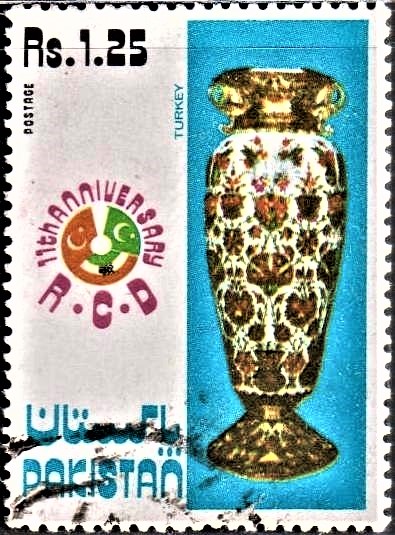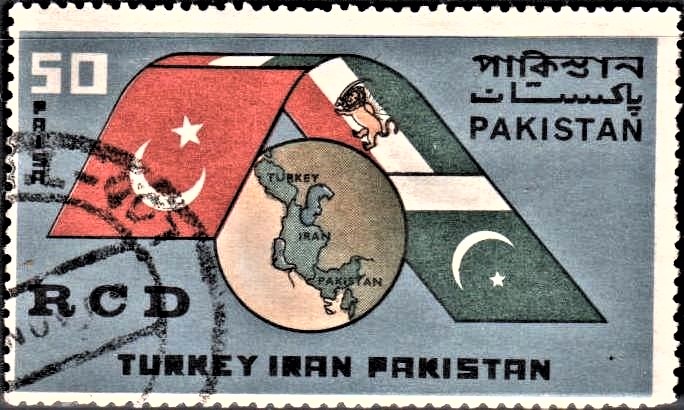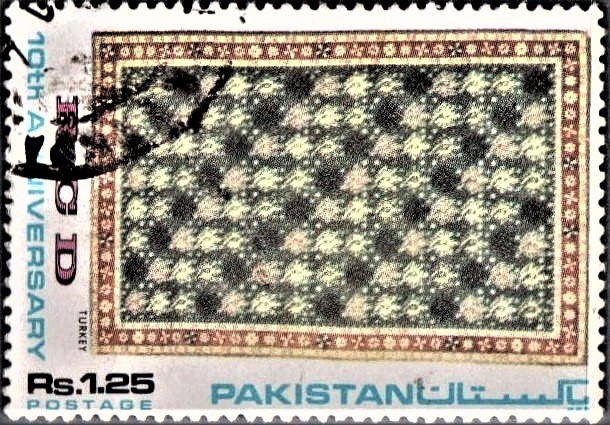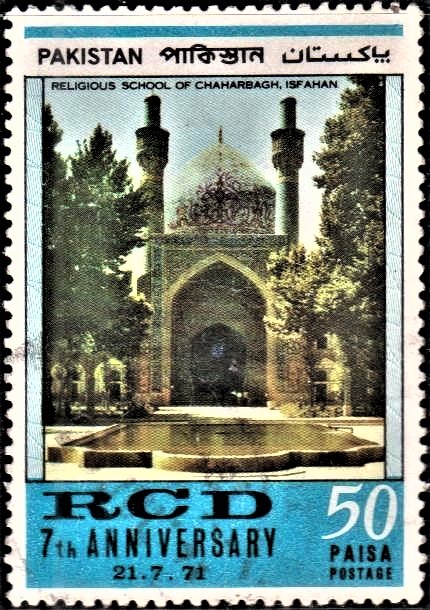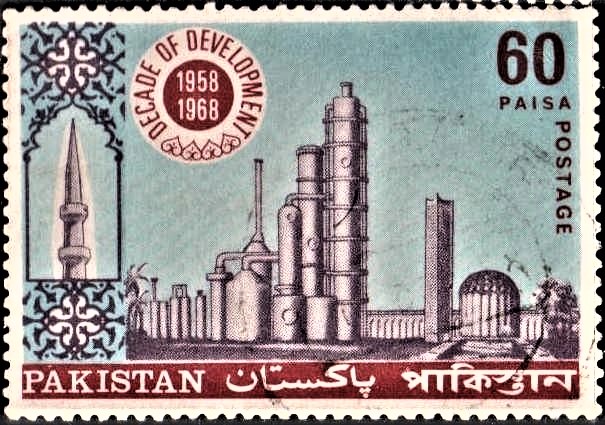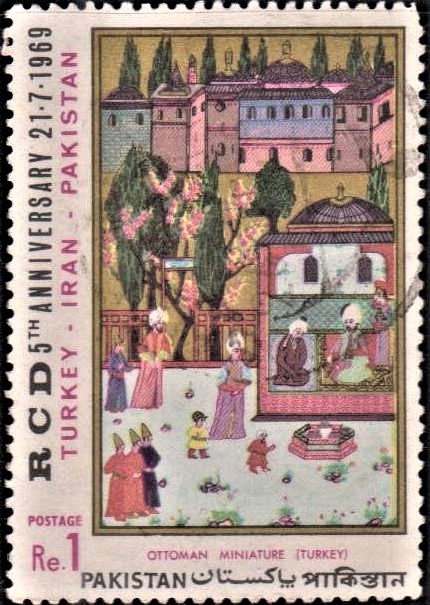
Pakistan on Regional Co-operation for Development 1969
Complete set of 3 nos. of commemorative postage stamp on the 5th Anniversary of the Signing of the Regional Cooperation for Development (R.C.D.) Pact by Turkey, Iran and Pakistan :
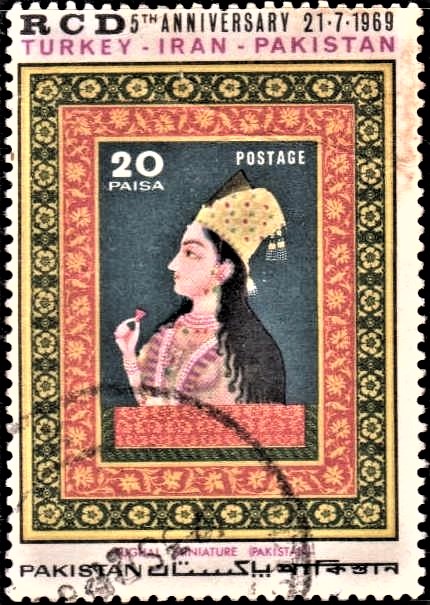
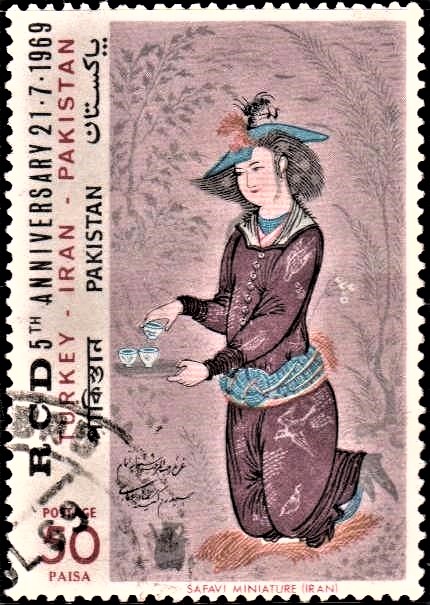
 Issued by Pakistan
Issued by Pakistan
Issued on Jul 21, 1969
Issued for : To mark the Fifth Anniversary of the establishment of the Regional Co-operation for Development, the Pakistan Post Office is issuing a set of three commemorative postage stamps of 20 Paisa, 50 Paisa and Re. 1.00 denominations on the 21st July, 1969. Sets of three commemorative stamps in similar designs are also being issued simultaneously by the Governments of Iran and Turkey on the same date.
Design :
20 Paisa Stamp : The format of the stamp is rectangular and vertical. It comprises the reproduction of a Mughal Miniature painting belonging to the mid 18th Century. The painting depicts the half length portrait of a lady seated in a balcony. She holds a cup in her hand and wears a tall bejewelled hat on her head, from which her hair cascades on her shoulders. On top of the stamp appears the caption “RCD 5th Anniversary” and “21-7-1969” in black and the words Turkey, Iran and Pakistan in red. Below the miniature appear the words “Mughal Miniature (Pakistan)” in red, and the word “Pakistan” in English, Urdu and Bengali in black. The denomination “20 Paisa” and the word “Postage” appear in the reverse in the background of the portrait.
50 Paisa Stamp : The format of the stamp is rectangular and vertical. The major portion of the stamp is devoted to the reproduction of a miniature painting done by Reza Abbasi who lived in the first half of the 17th Century and was one of the well-known Safavi (Isfahan) miniaturists. In a panel to the left of the miniature appear the words “RCD 5th Anniversary” and “21-7-1969” in black and the words Turkey, Iran and Pakistan in red. The word “Pakistan” in Bengali, English and Urdu is written in black. The denomination “50 Paisa” and the word “Postage” are in red in the lower left corner of the stamp. Below the miniature appear the words “Safavi Miniature (Iran)” in red.
Re. 1.00 Stamp : The format of the design is rectangular and vertical. It comprises the reproduction of a miniature painting showing the Ottoman Soultan Suleiman, The Magnificent, receiving Sheikh Abdul Latif. The miniature has been taken from “The Book of Exploits” – Hunername – compiled in the year 1588. The panel to the left of the stamp bears the caption “RCD 5th Anniversary” and “21-7-1969” in black and the words Turkey, Iran and Pakistan in red. The words “Ottoman Miniature (Turkey)” in red and the word “Pakistan” in English, Urdu and Bengali in black appear below the miniature. The word “Postage” and the denomination “Re. 1” are given in red in the lower left corner of the stamp.
Type : Stamps, Postal Used
Denomination : 20 & 50 Paisa and 1 Rupee
Colour :
20 Paisa : Yellow, Red, Blue, Black, Dark Blue and Gold
50 Paisa : Brown, Green, Red, Blue, Black and Gold
Re. 1.00 : Yellow, Red, Blue, Black and Gold
Size of Stamps : 51.2 x 35.5 mm
Size of Prints : 47.8 x 32 mm
Perforation Gauge : 13 x 13 (c)
Quantity Printed : 10,00,000 pieces each
Number of stamps in each sheet : 50
Process of Printing : Litho Offset
Printers : The Pakistan Security Printing Corporation Ltd., Karachi
About :
- The Regional Co-operation for Development (RCD) is a tripartite movement by Iran, Pakistan and Turkey aimed at closer economic, technical and cultural co-operation and promoting economic advancement and welfare of over 180 million people of this Region. The decision to form this economic grouping was taken on July 21st, 1964 by the Heads of State/Government of Iran, Pakistan and Turkey who had gathered in Istanbul in a Summit meeting.
- The establishment of RCD was a natural evolution of historic forces that had been at work over the past centuries. The three brotherly nations of Iran, Pakistan and Turkey already had much in common and their association towards a solid regional economic group was found to be most natural. The three are neighbours and they enjoy ancient historical ties. They are more or less at the same stage of economic development. They have common cultural background and common outlook for the future. These major factors, of course facilitated the three Governments of Iran, Pakistan and Turkey to consider the development of specific plans and projects aimed at strengthening the national development efforts through active and closer collaboration on a regional basis.
- The concept of RCD and its purposes have aroused enthusiasm and expectations among the peoples of Iran, Pakistan and Turkey. It is not only helping to build up the economic and industrial structure and cultural outlook of Iran, Pakistan and Turkey but is also contributing towards peace and goodwill in the Region. By and large, the actual working of this tripartite movement has created an appreciation of its usefulness and its contribution to the noble cause of ensuring peace, security and prosperity of mankind.
- 21st July, 1964 – 21st July, 1969
During the period of five years of its existence, the RCD has made significant strides and has concrete results to show. It has not only defined the scope of its working, taken organisational shape and established certain basic infra-structure facilities and institutional arrangements but has also emerged successfully from the stage of basic planning and preparatory work and has entered the phase of implementation covering a large area of co-operation in the socio-economic fields. - Industry, Petroleum and Petro–chemicals
The progress in the field of joint industrial enterprises has been very satisfactory. Fifty-four industrial projects have been approved or approved in principle for development on a joint basis out of which 17 projects are in various stages of implementation. The progress in the construction of filling stations at the border areas has been satisfactory and the construction of Izmir Oil Refinery – a joint venture between Iran and Turkey – is progressing satisfactorily. An oil pipeline from Iran to a Mediterranean port in Turkey; joint exploration and exploitation of oil on RCD basis in Iran are other important projects which are under active consideration of the Member Governments. - Trade
A number of measures such as the establishment of RCD Chamber of Commerce and Industry; Agreement on the RCD Union for Multilateral Payments arrangements; preparation of the RCD Banking Manual; the creation of RCD Re-insurance Pools, and RCD Agreement on Trade have been taken by the Member Governments for the promotion of intra-regional trade. The RCD Commerce and Economy Ministers in their meeting at Tehran in September, 1968 took a number of decisions which included the Commodity Exchange Agreement to increase intra-regional trade. In pursuance of their decision, a study with the assistance of UNCTAD has also been undertaken with a view to identifying all barriers impeding intra-regional trade and making recommendations for the liberalisation and expansion of such trade. - Transport and Communications
The co-operative efforts made in the fields of Transport and Communications have been very satisfactory. Semi-automatic trunk dialing system has been introduced between Tehran, Ankara and Karachi; postage, telephone and telegraphic rate have been reduced in the Region; the RCD Shipping Services started operation on the intra-regional routes from May, 1966 and from the US ports to Turkey and Pakistan in August, 1966. The construction of the RCD Highway linking Ankara–Tehran and Karachi is making reasonably good progress. As for the rail link, Pakistan railway system extends up to the Iranian city of Zahidan. The railway link between Tehran and Kashan is already in operation and the section between Kashan to Yazd and to Kerman is expected to be completed shortly. The section between Kerman and Zahidan has been included in the Fourth National Plan of Iran. The Tehran–Ankara rail link is expected to become fully operative by the end of 1969. RCD co-operation in the field of air transportation has resulted in the overall improvement of air services within the Region. - Technical co–operation and Public Administration
Member Governments signed an RCD Agreement for Technical Assistance which is under implementation since 1965. Under the Annual RCD Programme of Technical Assistance, a large number of experts, trainees and students are mutually exchanged between the three countries. For instance, the 1968 programme of Technical Co-operation provided for mutual exchange of 41 experts and 445 trainees and the 1969 programme of Technical Co-operation which provides for mutual exchange of 22 experts and 310 trainees is under implementation. - Social Affairs
Great emphasis is being laid on promoting cultural co-operation among the RCD countries at people to people level. Artists, sportsmen, writers and journalists are being exchanged under the annual Cultural Exchange programme. Furthermore, the RCD Cultural Institute is engaged in a systematic research in the common historical and cultural heritage of the three RCD countries with a view to making better known their history, civilisation and culture which binds the peoples of the Region together. The co-operation between the three Press, TV and other Information Media of the three countries is progressing very satisfactorily in order to bring the people of the Region closer together. - Issued by The Director-General, Pakistan Post Office, Karachi.


